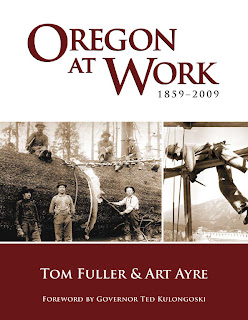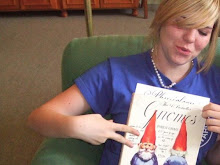The first book I remember that really changed my life was Shel Silverstein's Where the Sidewalk Ends. I believe I was 8 when I read it, but before I could read these treasured poems myself, my Dad read them to me as a child. My father was a 5th grade teacher, and his favorite book to read to his class was The BFG (The Big Friendly Giant) by Roald Dahl, so these poems suited his style. He was a fantastic reader, and looking over poems like Sarah Sylvia Cynthia Stout Would Not Take the Garbage Out, Smart, and Sick (my personal favorite) I'm reminded of my dad's cadence, the way he would make the whisper part of Sick raspy, and how he would cheerily utter, "Goodbye, I'm going out to play." I would giggle with him after dinner, or on a rainy afternoon we'd make a blanket fort, and he'd read to me. Dad loves limmericks and rhyming, and has always written funny, silly poems for special events, retirements, and birthdays.
I would sit there, listening, hearing the delicate phrasing, and an image of the scene would appear. Before I flipped the pages one day, I already knew what Sylvia and Peggy Ann looked like; I could see Peggy Ann acting out, pointing to her ailments, overreacting, and then trotting out the door on a Saturday. I began to imagine what this town looked like, and where the end of the sidewalk would be placed on a map. The town always reminded me of Portland, where my aunt lived back then. The events that occured in Where the Sidewalk Ends could never happen in small-ville Kelso where I was--it was far too boring.
When I finally read the poems from my childhood, they felt even more alive, more vibrant, and now the drawings flowed with the story, and created lively images, metaphors, and allusions in my head. I feel I have a fairly active, if not over-active imagination, and being read to simply fueled this notion. Reading it later helped me see the words, the lengths of phrases and sentences, where the comma went, or why he stopped the sentence where he did. His language was always so alive, full of youth, and contained a phenomenal amount of detail.
It changed the way I viewed poetry, writing, and how I relate to words today.
Friday, February 27, 2009
Friday, February 20, 2009
I'm No Sucka
I've only fallen victim to an e-marketing campaign when it actually benefited my bills. Somehow, Verizon Wireless found my email address. I really don't know how. I've never, ever given it to them...probably should look into that one... Anyhow, once, they sent an email telling me I was going over my text message plan, and if I added X package, I would save Y dollars. It made sense. I called them, and changed it within the week. I thought that was reasonable. Appreciated, even. I would rather spend $60 on a plan that fits me, than pay $120 including overages.
Until the last couple of weeks, I never really paid attention to how many newsletters and email stuff I get that isn't personal. Here's a list: NPR Movie, Book, and Music email--I have to have these; very important to me, Sallie Mae, Credit Report site, Ticketmaster, 94.7 NRK, two musicians, Verizon, Stuffwhitepeoplelike, a clothing boutique, and a couple of others that aren't that interesting. It's kind of amazing how little of thought I gave this until now, or how often I find myself saying, "Yeah, I do need to have regular updates about this!" I have now been cognant of what letters I actually read, and which just get deleted immediately.
A little note on Ticketmaster: They are a relentless failure with their e-marketing campaigns. They try to give me ticket and tour updates on the one band I've bought tickets for through them this year online, and they are always incorrect with their information, or the venue they're trying to sell me tickets to is nowhere near a realm of possibility for me to attend.
Until the last couple of weeks, I never really paid attention to how many newsletters and email stuff I get that isn't personal. Here's a list: NPR Movie, Book, and Music email--I have to have these; very important to me, Sallie Mae, Credit Report site, Ticketmaster, 94.7 NRK, two musicians, Verizon, Stuffwhitepeoplelike, a clothing boutique, and a couple of others that aren't that interesting. It's kind of amazing how little of thought I gave this until now, or how often I find myself saying, "Yeah, I do need to have regular updates about this!" I have now been cognant of what letters I actually read, and which just get deleted immediately.
A little note on Ticketmaster: They are a relentless failure with their e-marketing campaigns. They try to give me ticket and tour updates on the one band I've bought tickets for through them this year online, and they are always incorrect with their information, or the venue they're trying to sell me tickets to is nowhere near a realm of possibility for me to attend.
Thursday, February 12, 2009
Wonder Google

When I was 16, I found out out about the hottest, newest thing: Hotmail email! Everyone who was anyone had it. At the time, I was running AOL ("You've got mail!"). Naturally, being the sheep I was back then, I signed up for it. I wanted my whole name, but, as I've found, there is another Natalie Emery out there, who was much faster on the uptake for trends than I was. I settled for a mish-mash of my name with my softball number jersey. This email has since died after I went to college, but I checked it religiously. Now, I only use that email for sites where I'm required to enter an email address, which I'm sure they'll slap into a database to be used for spam later.
Right now, because I have an email for this class, I have three email accounts that I check regularly. Constantly, in fact. And since I've been in charge of the marketing group this year, that means that you have access to nearly every single one of Ooligan's inboxes. It's massive. It's challenging just to keep up. Granted, I'm not supposed to check all of these, but I'm involved in External Promotions, there's a 42 email specific inbox, an Oregon at Work blurb inbox, and many, many more. I don't check those inboxes very often, but it seems that when I don't for a spell, something has come up that I have to scramble to reply to.
But I do love, love, love my Gmail accounts. They make it easy to do everything there, and in the madness of webmail's thousand email addresses at Ooligan, it's nice to know that everything is under one roof. My calendar, some documents of my choosing, and I can label emails in a very organized fashion. Color-coded, even! Google has never ceased to amaze me, and I hope they never will.
Sunday, February 8, 2009
Ooligan to Release Oregon at Work

In April, Ooligan Press will release Oregon at Work: 1859-2009, by Tom Fuller and Art Ayre. The authors, a former KGW television reporter and state economist collaborated on the book as the state department of labor's official contribution to Oregon's 150th birthday celebration. Oregon at Work follows Oregon's past from the Oregon Trail pioneers to Nike and Intel.
Oregon at Work looks at timber, farming, banking, construction, technology, and commercial industries, as well as women's emerging roles in the labor force. The book includes personal stories from decendants of pioneers, immigrants, and laborers who have contributed to Oregon's cultural fabric.
An official launch party will take place on April 8th in Salem at the capitol building's rotunda.
Sunday, February 1, 2009
Superbowl Marketing
I'm a baseball fan. I grew up watching the Mariners (don't get me started about recent years). As a 14 year-old, I remember waiting outside the King Dome for a peek at Alex Rodriguez. I played competitive softball all my life. The World Series should be a religious holiday, in my opinion.
But football, especially the Superbowl? Pssht. I always say, "I'm rooting for the commercials". In years past, I watched Michael Jackson and Coke commercials in 3D, seen the "Superbowl Shuffle" by the Bears, and been inundated by the barrage of Budweiser commercials with horses, and tree frogs.
This year, I was shocked!
With the economy in the proverbial tanker, marketers and advertisers have probed the "penny pincher" or out-of -work market to the full degree. I've never seen Monster or Careerbuilder.com have such an immediate audience! They each (mostly, careerbuilder.com) had imaginative ads, that made relative sense to their market. Ads now need to be much more creative than in the past.
Gone are the days when Michael Jordan can twirl a basketball on his finger in order to sell some Wheaties. This generation is different. We want to check things out before we will totally commit to a brand or product. That's why, I think I saw so many websites featured in the commercials this year: Monster.com, careerbuilder.com, nfl.com, nfl.com/play, and yes, cash4gold.com! Before you buy, you can check it out and choose whether to utilize their services/products or not.
This year, because the ad rates for Superbowl were so expensive, they offered a one-second ad. It was Miller High Life. It was a guy standing in front of a bunch of casks saying, "Miller High Life!" with a big grin. One second! That probably cost them somewhere around $300,000.
Most of the big ads were synergy propelled from new movies coming out of production studios owned by GE/NBC, which was disgusting. But when you have a mass market event, with hundreds of millions of viewers, and have the money, it can be worth your while.
I guarantee people without income or are laid-off will go to careerbuilder.com to see if they can save them from being called a dummy and screaming in the car before they go in to work. Although times are tough in the U.S. right now, there are places that thrive in times like these, and companies who can figure out how to connect in creative and sensitive ways, will flourish.
I still like those Clydesdale's Budweiser commercials, though. They always do such a good job...
But football, especially the Superbowl? Pssht. I always say, "I'm rooting for the commercials". In years past, I watched Michael Jackson and Coke commercials in 3D, seen the "Superbowl Shuffle" by the Bears, and been inundated by the barrage of Budweiser commercials with horses, and tree frogs.
This year, I was shocked!
With the economy in the proverbial tanker, marketers and advertisers have probed the "penny pincher" or out-of -work market to the full degree. I've never seen Monster or Careerbuilder.com have such an immediate audience! They each (mostly, careerbuilder.com) had imaginative ads, that made relative sense to their market. Ads now need to be much more creative than in the past.
Gone are the days when Michael Jordan can twirl a basketball on his finger in order to sell some Wheaties. This generation is different. We want to check things out before we will totally commit to a brand or product. That's why, I think I saw so many websites featured in the commercials this year: Monster.com, careerbuilder.com, nfl.com, nfl.com/play, and yes, cash4gold.com! Before you buy, you can check it out and choose whether to utilize their services/products or not.
This year, because the ad rates for Superbowl were so expensive, they offered a one-second ad. It was Miller High Life. It was a guy standing in front of a bunch of casks saying, "Miller High Life!" with a big grin. One second! That probably cost them somewhere around $300,000.
Most of the big ads were synergy propelled from new movies coming out of production studios owned by GE/NBC, which was disgusting. But when you have a mass market event, with hundreds of millions of viewers, and have the money, it can be worth your while.
I guarantee people without income or are laid-off will go to careerbuilder.com to see if they can save them from being called a dummy and screaming in the car before they go in to work. Although times are tough in the U.S. right now, there are places that thrive in times like these, and companies who can figure out how to connect in creative and sensitive ways, will flourish.
I still like those Clydesdale's Budweiser commercials, though. They always do such a good job...
Direct Sales: The Extension of Marketing
Direct sales will always be a part of a marketing/sales strategy. Although the revenue may not be a significant part of the total, it plays a significant role. First, it allows publishers to see who really cares. Who is coming to your site, and who is responding to your marketing. If you have the software to track who is visiting your site and if they subscribe to an e-newsletter, or purchase a book, you have an automatic database for follow-up contact, or to try to sell them another title.
Does it matter? I think, yes. I think it's worth the time and energy to set the stage for someone to really respond to your publishing program, writers, and offer an "exclusive" chance for people to know what's to come. It allows fans to feel "more connected" to your publishing/authors/brand.
I'm not sure publishers can expect to see direct impact on their sales, but that isn't the point. Readers have so many ways to connect to writers and publishers with technology these days. If publishers don't have avenues to have some kind of communication with their most loyal of readers, they'll find somewhere else to do so. It seems that if they don't have some way for that dialogue to occur with readers, they'll lose another marketing opportunity. The Amazon Way of "If you like this, you'll surely like this".
The real reason publishers do this, is to keep track of who is responding, and to keep needling away at niche markets. Like this YA vampire novel? Well, next month, we're releasing another YA novel, not vampires, but WITCHES! Keeping people segmented, and pinned to a niche has worked well for many publishers and companies.
Does it matter? I think, yes. I think it's worth the time and energy to set the stage for someone to really respond to your publishing program, writers, and offer an "exclusive" chance for people to know what's to come. It allows fans to feel "more connected" to your publishing/authors/brand.
I'm not sure publishers can expect to see direct impact on their sales, but that isn't the point. Readers have so many ways to connect to writers and publishers with technology these days. If publishers don't have avenues to have some kind of communication with their most loyal of readers, they'll find somewhere else to do so. It seems that if they don't have some way for that dialogue to occur with readers, they'll lose another marketing opportunity. The Amazon Way of "If you like this, you'll surely like this".
The real reason publishers do this, is to keep track of who is responding, and to keep needling away at niche markets. Like this YA vampire novel? Well, next month, we're releasing another YA novel, not vampires, but WITCHES! Keeping people segmented, and pinned to a niche has worked well for many publishers and companies.
Subscribe to:
Posts (Atom)
